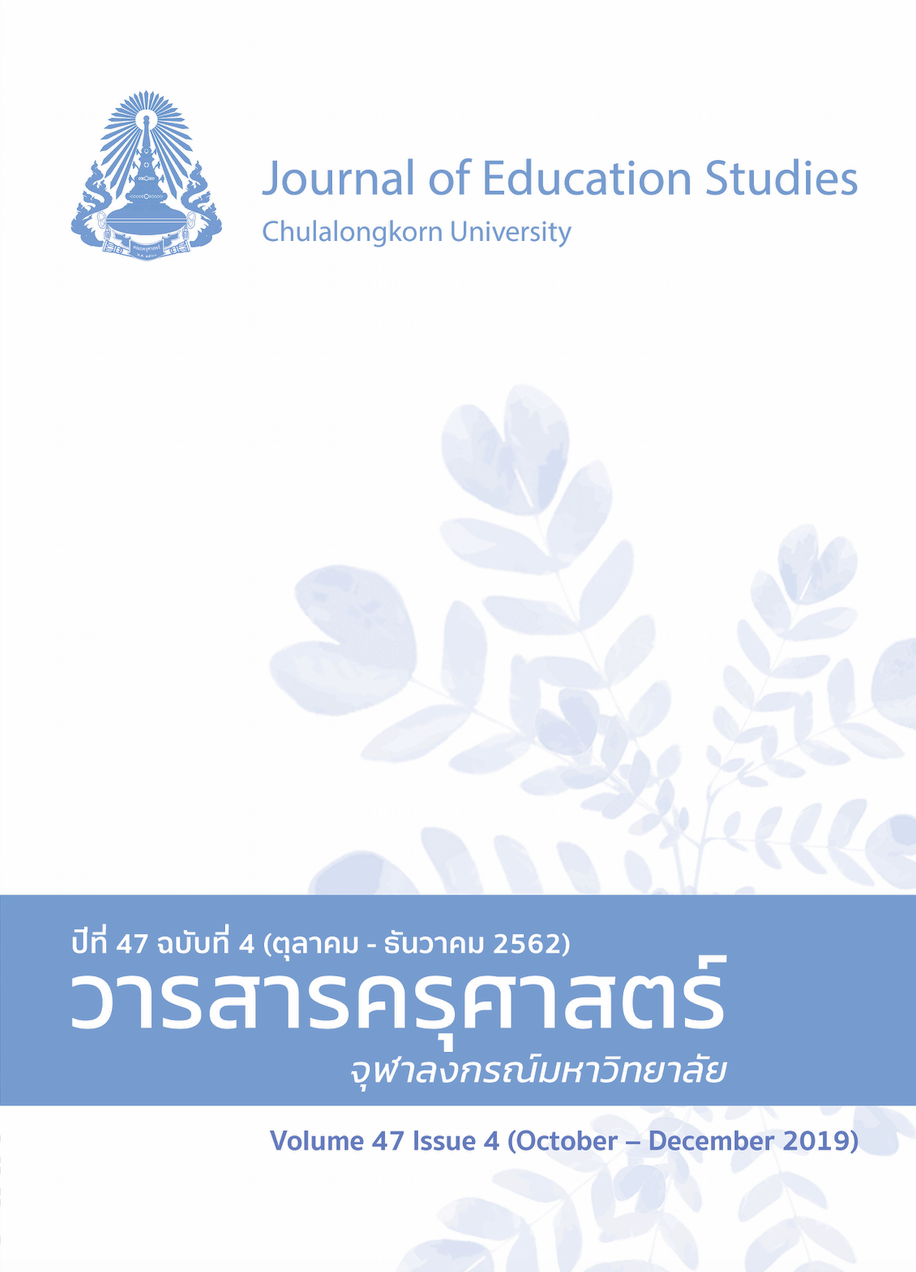Democratic Skill Development for Young Children: A Survey Research
Keywords:
DEVELOPMENT, YOUNG CHILDREN, DEMOCRATIC SKILLAbstract
The objectives of this survey research were: 1) to study the young children’s characteristics which lead to the democratic skills development and 2) to study the ways to develop the democratic skills in the school. The 207 samples composed of administrators, kindergarten teachers, lecturers and students from the early childhood education program were asked to complete the questionnaires. The frequency, percentage, means and standard deviation were used to analyze the data.
The results indicated that: 1) the importance of the democratic characteristics leading to democratic skills were found at the high and the highest levels; the first important characteristic is the respect of one’s own right and the others, the second is the respect of the agreement, rules and regulations as well as participating in group working and learning from the group. 2) The proposed guidelines to develop the democratic skills in the school were ranked at the highest level of appropriateness. The first most appropriate one is integrating through play and direct experience from hand-on activities in order to help children to understand and absorb the skills. The other way is the cultivation of ethics, consciousness and self-discipline in daily activities depending on occasions and ages, allowing young children to think together and to give a reasonable explanation in making agreements in the classroom and respecting the agreements, rules and regulations.
References
กระทรวงศึกษาธิการ. (2560). หลักสูตรการศึกษาปฐมวัยพุทธศักราช 2560. กรุงเทพมหานคร: ชุมนุมสหกรณ์การเกษตรแห่งประเทศไทย.
ศศิธร อมรินทร์แสงเพ็ญ. (2554). การวิเคราะห์องค์ประกอบและการพัฒนาลักษณะประชาธิปไตยของเด็ก (วิทยานิพนธ์ปริญญาดุษฎีบัณฑิต ไม่ได้ตีพิมพ์). มหาวิทยาลัยศรีนครินทรวิโรฒ, กรุงเทพมหานคร.
สำนักงานคณะกรรมการการศึกษาแห่งชาติ. (2545). พระราชบัญญัติการศึกษาแห่งชาติ พ.ศ. 2542 และที่แก้ไขเพิ่มเติม (ฉบับที่ 2) พ.ศ. 2545. กรุงเทพมหานคร: พริกหวานกราฟฟิก.
สมบัติ ธำรงธัญวงศ์. (2551). ปัจจัยภูมิหลังวัฒนธรรมการเมืองและการมีส่วนร่วมทางการเมืองของผู้นำเยาวชนไทย (รายงานผลการวิจัย). กรุงเทพมหานคร: คณะรัฐประศาสนศาสตร์ สถาบันบัณฑิตพัฒนบริหารศาสตร์.
อรปวีณ์ นามสนิท. (2559). การวิเคราะห์เนื้อหาเรื่องประชาธิปไตยในกลุ่มสาระสังคมศึกษา ศาสนาและวัฒนธรรมในระดับประถมศึกษา (วิทยานิพนธ์ปริญญามหาบัณฑิต ไม่ได้ตีพิมพ์). จุฬาลงกรณ์มหาวิทยาลัย, กรุงเทพมหานคร.
อุรารัตน์ ทรัพย์มูล. (2555, 17 มิถุนายน). การเลี้ยงดูเด็กปฐมวัย. สืบค้นจากhttp://kruaom55.blogspot.com/2012/06/blog-post_17.html
ภาษาอังกฤษ
Durfjord, K., Fumat, Y., Kuser, M. P., & Anderson, R. (2004). Professional guidance: Citizenship education and identity in courses for those who will work with pre-school children. London: CiCe Central Coordination Unit.
Gartrell, D. (2012). Education for a civil society: How guidance teaches young children democratic life skills. Washington, DC: The National Association for the Education of Young Children.
Gartrell, D. (2013). Democratic life skill 2: Guiding children to express strong emotion in nonhurting ways. Young Children, 68(1), 90.
Moss, P. (2007). Bringing politics into the nursery: Early childhood education as a democratic practice. Working Paper 43. The Hague, Netherlands: Bernard van Leer Foundation.
Vonta, T. (2007). Vygotsky’s ideas in the new democracies. Children in Europe, Vygotsky Issue(13), 21–23.




